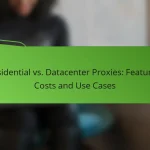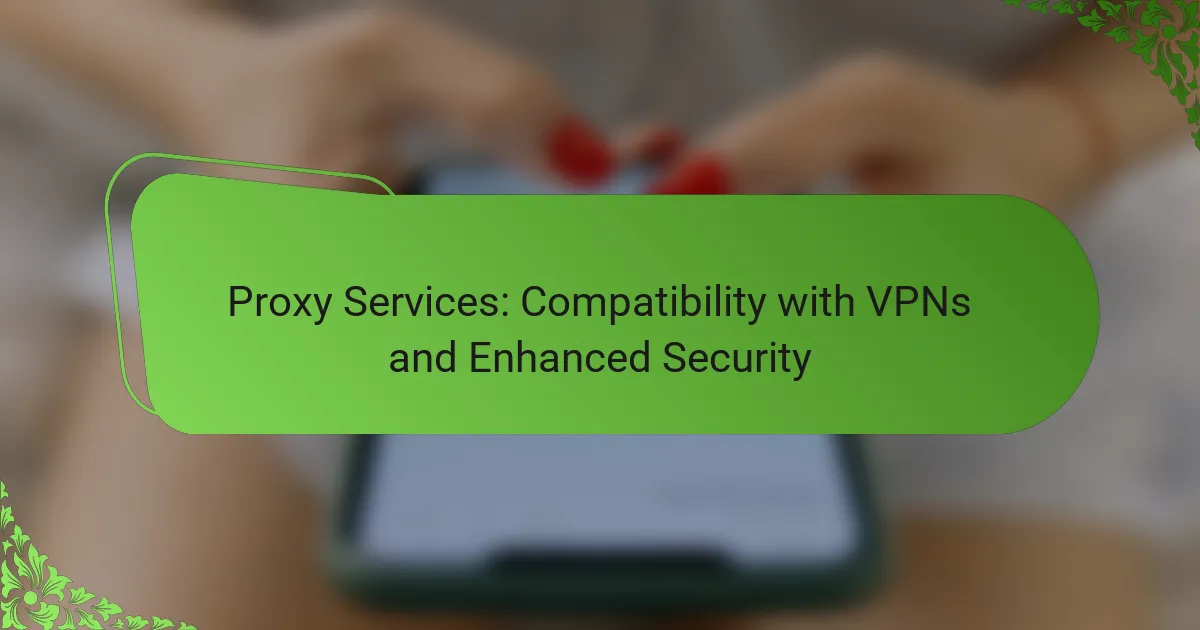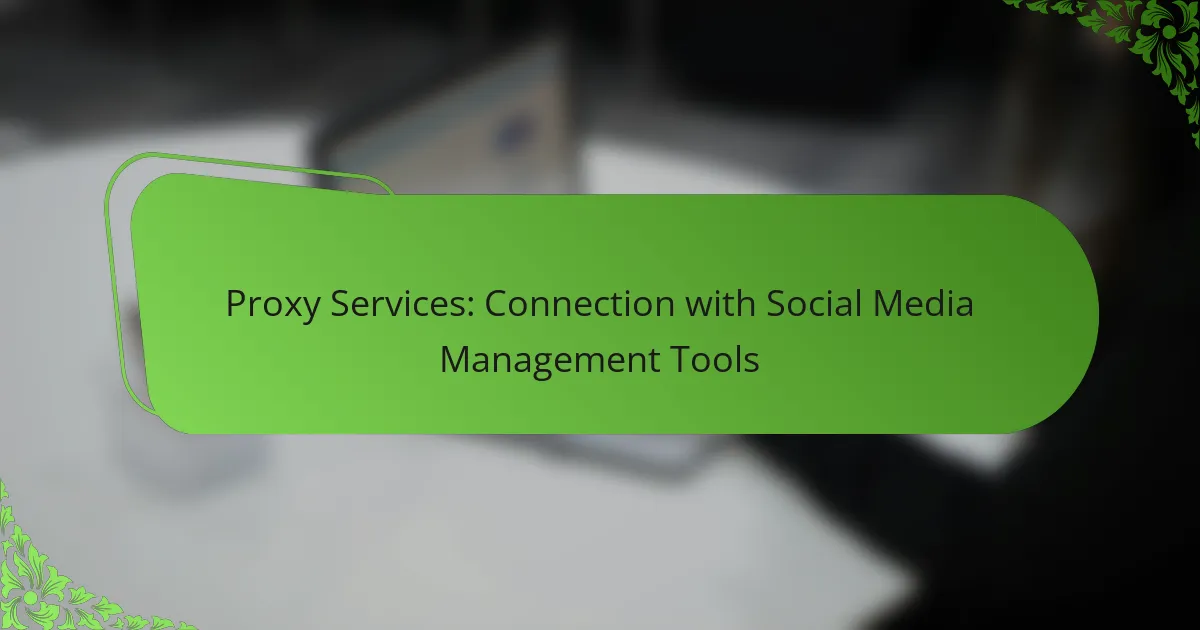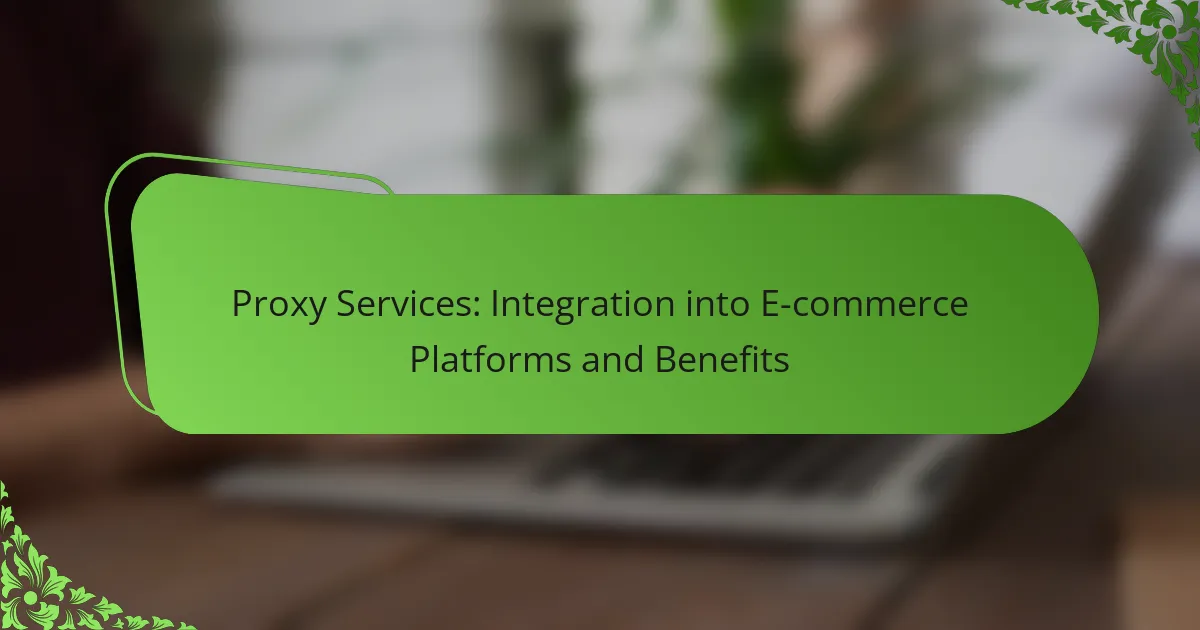Proxy services provide an additional layer of security when used alongside VPNs, making it more difficult for third parties to track online activities. By routing internet traffic through separate servers, proxies can effectively obscure a user’s identity and location. When compatible with popular VPNs, they enhance both security and privacy while improving speed and access to geo-restricted content.
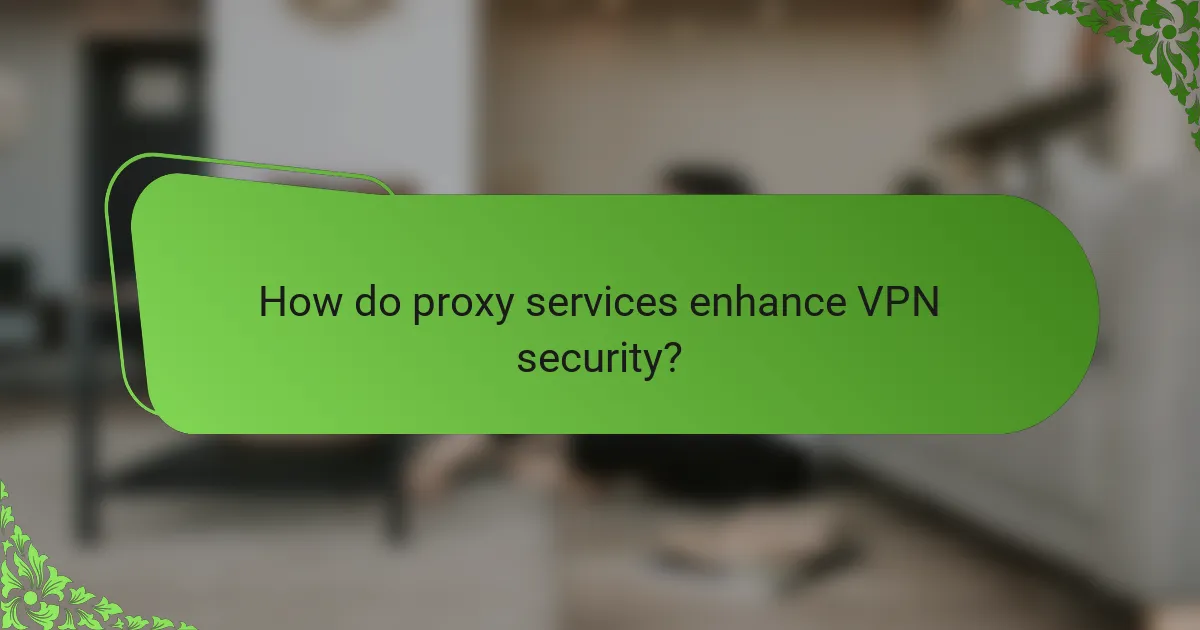
How do proxy services enhance VPN security?
Proxy services enhance VPN security by adding an additional layer of protection, making it harder for third parties to track online activities. They work by routing internet traffic through a separate server, which can obscure the user’s identity and location while using a VPN.
Increased anonymity
Using a proxy service alongside a VPN significantly boosts user anonymity. The proxy acts as an intermediary, hiding the user’s IP address from websites and online services. This dual-layer approach makes it more challenging for anyone to trace online actions back to the user.
For instance, if a user connects to a VPN and then routes their traffic through a proxy, their real IP address remains concealed from the final destination. This setup is particularly useful for individuals who prioritize privacy, such as journalists or activists.
IP masking
IP masking is a key feature of proxy services that enhances security when used with a VPN. By masking the user’s original IP address, proxies prevent websites from identifying the user’s true location. This is essential for accessing geo-restricted content or maintaining privacy while browsing.
When combined with a VPN, the IP address seen by external sites is that of the proxy server, not the user’s. This can be beneficial for users in regions with strict internet regulations, allowing them to access content without revealing their actual location.
Data encryption
Data encryption is another critical aspect of how proxy services enhance VPN security. While VPNs typically encrypt data between the user and the VPN server, adding a proxy can further secure the data as it travels to its final destination. This layered encryption helps protect sensitive information from potential interception.
Users should ensure that the proxy service they choose supports strong encryption standards. For example, protocols like HTTPS or SOCKS5 can provide robust security, making it difficult for hackers to access transmitted data. Always verify that both the VPN and proxy service are reputable to maximize security benefits.

Which proxy services are compatible with popular VPNs?
Many proxy services work seamlessly with popular VPNs, enhancing security and privacy. Compatibility varies by provider, so it’s essential to check specific configurations and features.
NordVPN with Smart DNS
NordVPN offers Smart DNS, which allows users to bypass geo-restrictions while maintaining a secure connection. This feature is particularly useful for streaming services that may block VPN traffic.
To use Smart DNS with NordVPN, users need to configure their device’s DNS settings manually. This process typically involves entering the Smart DNS IP addresses provided by NordVPN into the network settings of the device.
ExpressVPN with SOCKS5 proxy
ExpressVPN supports SOCKS5 proxy, which is ideal for users looking for faster speeds while torrenting or streaming. SOCKS5 does not encrypt traffic, so it’s best used in conjunction with the VPN for enhanced security.
Setting up the SOCKS5 proxy with ExpressVPN involves entering the proxy server address and port in the application settings. Users should ensure they also have their VPN active for maximum protection.
Surfshark with Shadowsocks
Surfshark includes Shadowsocks, a secure proxy that provides a high level of privacy and is effective in bypassing internet censorship. This is particularly beneficial in regions with strict online regulations.
To enable Shadowsocks with Surfshark, users must download the Shadowsocks configuration file and input the necessary details into the Surfshark app. This setup allows for a more flexible browsing experience while maintaining security.
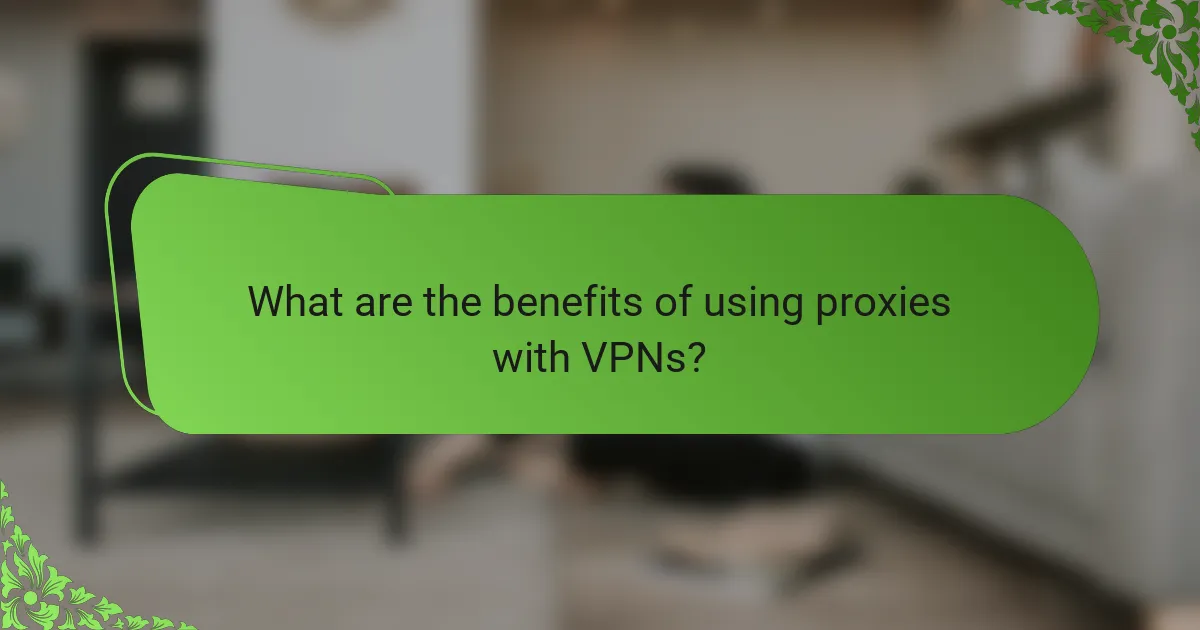
What are the benefits of using proxies with VPNs?
Using proxies with VPNs can enhance your online experience by improving speed, providing access to geo-restricted content, and enabling the bypassing of network restrictions. This combination leverages the strengths of both technologies to offer better performance and security.
Improved speed
Combining proxies with VPNs can lead to improved speed by distributing the load between the two services. Proxies can handle requests and cache data, reducing latency and improving response times for frequently accessed content.
For instance, when streaming videos, a proxy can cache the video data, allowing for faster loading times. Users may notice speed enhancements, particularly when accessing content that is geographically closer to the proxy server.
Access to geo-restricted content
Proxies paired with VPNs enable users to access geo-restricted content by masking their IP addresses and making it appear as though they are browsing from a different location. This is particularly useful for streaming services that limit content based on geographic regions.
For example, a user in Europe can use a US-based proxy with a VPN to access American streaming platforms. This combination not only bypasses restrictions but also maintains a level of privacy and security during the process.
Bypassing network restrictions
Using proxies with VPNs can effectively bypass network restrictions imposed by ISPs or organizations. This is particularly beneficial in environments like schools or workplaces where access to certain websites may be blocked.
For example, if a workplace restricts access to social media, a user can connect to a proxy through their VPN to access these sites without detection. However, it’s essential to ensure that this practice complies with local laws and organizational policies to avoid potential repercussions.
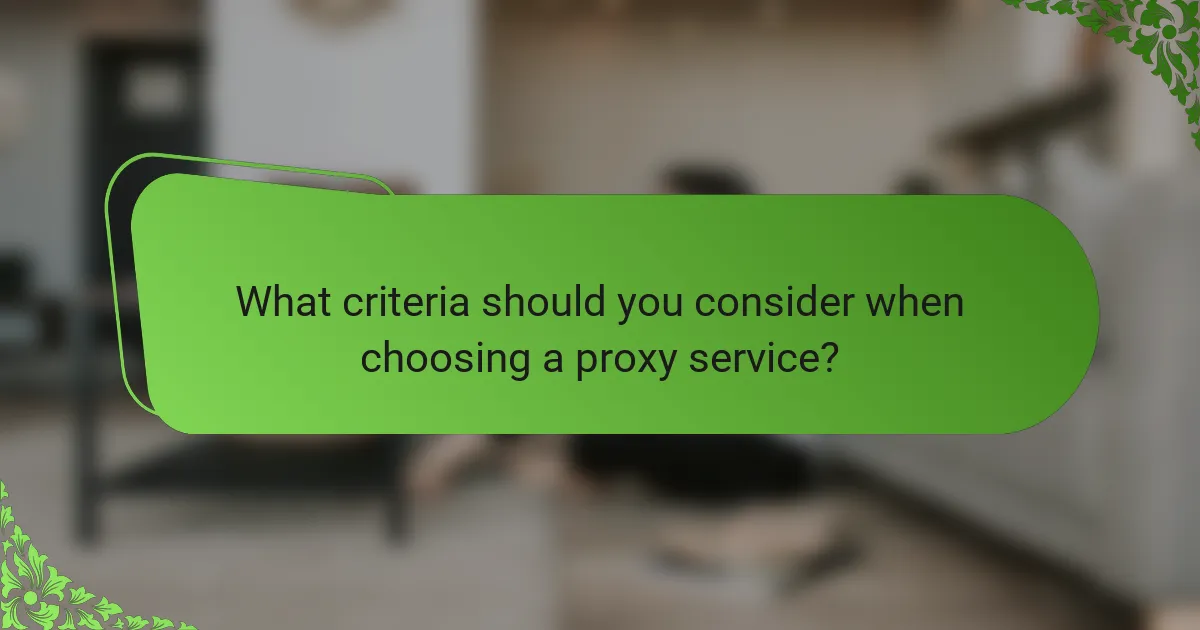
What criteria should you consider when choosing a proxy service?
When selecting a proxy service, consider compatibility with VPNs, security features, and pricing plans. Each of these factors plays a crucial role in ensuring that the proxy meets your specific needs for online privacy and performance.
Compatibility with VPNs
Compatibility with VPNs is essential for users who want to maximize their online security. Some proxy services work seamlessly with VPNs, allowing for an additional layer of encryption and privacy. Check if the proxy can be configured to operate alongside your VPN without causing connectivity issues.
When evaluating compatibility, look for proxies that support common VPN protocols like OpenVPN or IKEv2. This ensures that you can maintain a secure connection while using both services simultaneously.
Security features
Security features are vital when choosing a proxy service, as they protect your data from potential threats. Look for proxies that offer strong encryption, such as AES-256, to safeguard your internet traffic. Additionally, features like IP masking and DNS leak protection can further enhance your online anonymity.
Consider whether the proxy service has a no-logs policy, which means they do not store your browsing history. This is particularly important for users who prioritize privacy and want to minimize their digital footprint.
Pricing plans
Pricing plans for proxy services can vary widely, so it’s important to find one that fits your budget while offering the necessary features. Many providers offer tiered pricing based on the number of simultaneous connections or bandwidth limits. Expect to pay anywhere from a few dollars to over $20 per month, depending on the service level.
Before committing, take advantage of free trials or money-back guarantees to test the service. This allows you to evaluate performance and features without upfront costs, ensuring that you make an informed decision.
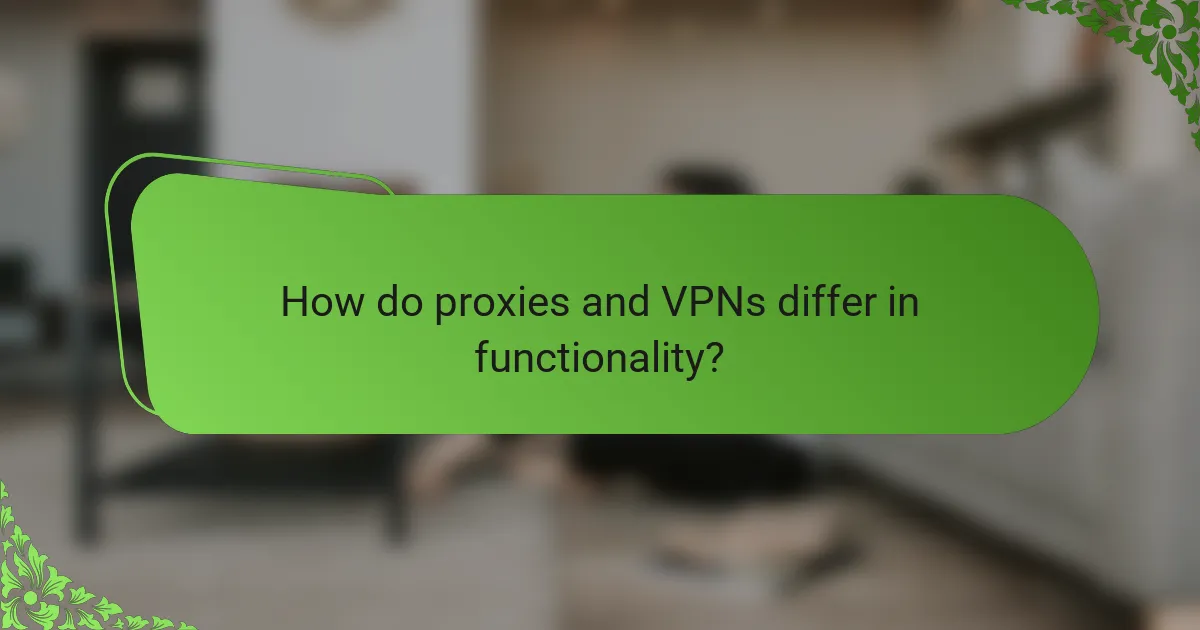
How do proxies and VPNs differ in functionality?
Proxies and VPNs serve different purposes in online privacy and security. While both can mask your IP address, proxies primarily act as intermediaries for web traffic, whereas VPNs create a secure tunnel for all internet data, providing enhanced encryption and privacy.
Data routing methods
Proxies route your internet traffic through a specific server, allowing you to access content as if you were in that server’s location. This method can be effective for bypassing geo-restrictions but does not encrypt your data, leaving it vulnerable. In contrast, VPNs route all your internet traffic through a secure server, ensuring that your data is encrypted from your device to the VPN server.
When choosing between the two, consider that proxies are often faster for specific tasks like streaming, while VPNs provide comprehensive protection for all online activities.
Encryption levels
Proxies typically do not offer encryption, which means your data can be intercepted by third parties. This lack of security can be a significant drawback if you’re handling sensitive information. On the other hand, VPNs use strong encryption protocols, such as OpenVPN or IKEv2, to secure your data, making it much harder for anyone to access your online activities.
For users concerned about privacy, opting for a VPN is advisable due to its robust encryption capabilities, which can protect your data even on unsecured networks.
Use cases
Proxies are commonly used for tasks like web scraping, accessing region-locked content, or managing multiple social media accounts. They are suitable for users who need to change their IP address without requiring high-level security. Conversely, VPNs are ideal for users who prioritize privacy and security, such as those accessing public Wi-Fi or sensitive corporate data.
When deciding which to use, assess your needs: if you need speed and access to specific content, a proxy may suffice; if you require security and privacy, a VPN is the better choice.
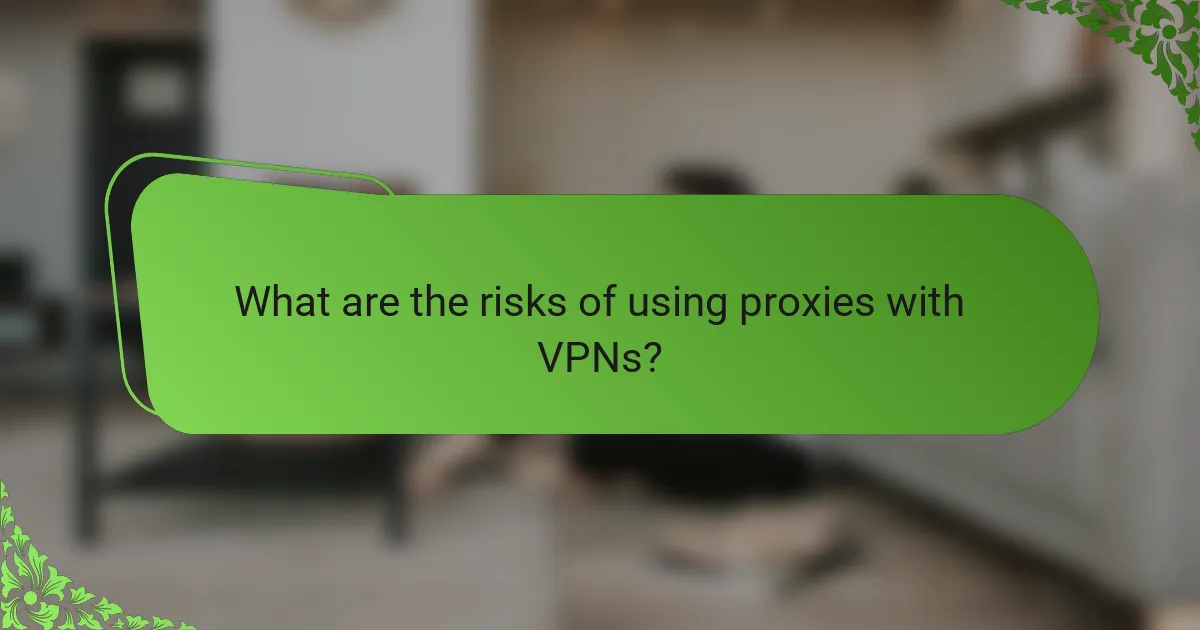
What are the risks of using proxies with VPNs?
Using proxies with VPNs can introduce several risks, including potential data leaks and reliance on unreliable free proxies. These factors can compromise your online security and privacy, making it essential to understand the implications before combining these services.
Potential data leaks
Data leaks can occur when using proxies with VPNs, primarily due to misconfigurations or vulnerabilities in either service. For example, if a proxy fails to encrypt your data properly, sensitive information may be exposed even when connected to a VPN.
To mitigate this risk, ensure that both your proxy and VPN use strong encryption protocols. Regularly check for updates and security patches to maintain the integrity of your connection.
Reliability of free proxies
Free proxies often lack the reliability and security features of paid services, which can lead to various issues, including slow speeds and increased risk of data interception. Many free proxies may log user activity or inject ads, further compromising your privacy.
When considering a proxy, it’s advisable to choose a reputable paid service that offers transparency regarding its privacy policies and security measures. Investing in a quality proxy can significantly enhance your overall online security when used alongside a VPN.
